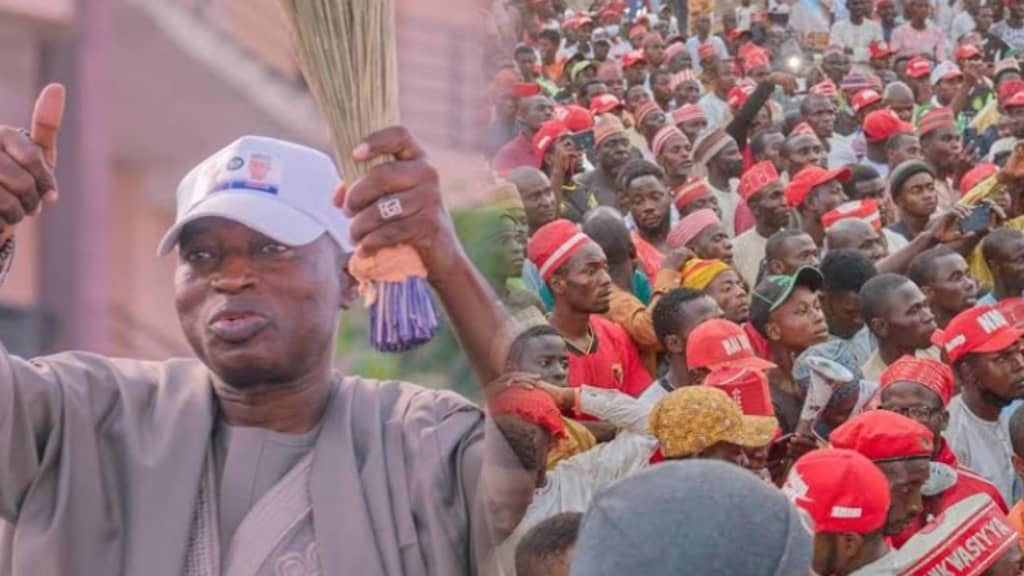Politics
Ata’s Effect: 50,000 NNPP Members in Kano Reportedly Set to Join APC

In a political shakeup attributed to Ata’s influence, 50,000 NNPP members in Kano are reportedly preparing to decamp to the APC, signaling a major realignment in the state’s political landscape.
In what is anticipated to be a major change in Kano’s political arena, more than 50,000 members of the New Nigeria People’s Party (NNPP) are reportedly planning to switch allegiance to the ruling All Progressives Congress (APC).
The expected defections follow increasing dissatisfaction within the NNPP, alongside a revitalized APC bolstered by strategic appointments and strong mobilization efforts.
At the heart of this political momentum is President Bola Ahmed Tinubu’s recent appointment of Rt. Hon. Yusuf Abdullahi Ata as Minister of State for Housing and Urban Development.
Ata, a prominent political figure in Kano, has rallied support for the APC, especially among grassroots members who view his appointment as a confirmation of Kano’s importance on the national political stage.
Political analysts point to the perceived inconsistencies and ineffective governance of the NNPP administration in Kano as reasons for recent defections. Many individuals who initially became part of the Kwankwasiyya movement, under former Governor Rabiu Musa Kwankwaso’s leadership, are said to feel disenchanted, viewing their experience as a betrayal of promised ideals.
Alhaji Sani Musa, a member from Gwale Local Government, expressed his frustrations by saying, “Honestly, we were taken in by empty slogans and promises. We thought Kwankwasiyya would solve Kano’s problems, but look at our situation now—policies that fail to reach the masses and leaders who have grown disconnected from the people. The APC has demonstrated their ability to combine governance with effective action.”
In a similar vein, Ibrahim Aliyu from Dala expressed remorse for initially switching from the APC to the NNPP. He said, “Honestly, we were driven by emotions and pressure when we joined Kwankwasiyya. However, with the APC’s internal improvements and Tinubu’s emphasis on inclusivity, we’re eager to return home. The NNPP is like a leaking basket—unable to hold anything together.”
Fatima Umar, a Kwankwasiyya member from Kumbotso, emphasized the appeal of APC’s empowerment programs for younger voters. “The NNPP has let women and youth down significantly. We need tangible action instead of empty promises. Under Tinubu and Abdullahi Ata, the APC is achieving results,” she stated. “I am eager to support the APC in advancing progress in Kano.”
The anticipated defections, referred to by insiders as a “political tsunami,” result from months of strategic efforts orchestrated by the APC leadership at state and national tiers under the guidance of Dr. Abdullahi Umar Ganduje, former Governor of Kano State and current National Chairman of the APC.
Sources within the party, speaking on condition of anonymity, revealed plans to organize a large rally in Kano before the end of the year to officially welcome returning members. “This will be a historic event,” an official commented. “We are bringing back thousands who now see that APC is the only party with a vision for Nigeria’s future. The NNPP administration has been extremely disappointing.”
READ ALSO: APC Criticizes Makinde Over Conversion of Library Into Shopping Mall
Malam Adamu Yakasai, a member of the NNPP from Kano Municipal who is considering defection, did not hold back in his criticism of the Kwankwasiyya movement.
He stated, “The NNPP has lost its direction. Rather than bringing the state together, they have caused more division among us. Kano is renowned for politics that resonate with the common man—tebur siyasah—where the people’s voices are valued. However, within the NNPP it’s all about ‘I, me, myself.’ In contrast, APC provides a platform where collaboration and progress occur.”
The recent success of the APC in attracting members from the NNPP is linked to an event held in Abuja. Distinguished Senator Barau Jibril, the Deputy Senate President, recently welcomed hundreds of defectors from the NNPP at the Senate Press Center, significantly boosting party morale. In a symbolic gesture marking their transition to APC, these former members discarded their Kwankwasiyya red caps and accepted new ones from Senator Jibril. Alongside Ata’s appointment, this move underscores APC’s dedication to recognizing loyalty and competence within its ranks.
As the political climate in Kano intensifies, local analysts predict that these defections may put the NNPP at a significant disadvantage. One commentator described it as a “serious political back foot.” With more than 50,000 members departing, the party’s grassroots strength is likely to be undermined, casting doubt on its ability to stay competitive in future elections.
For numerous returnees, going back to the APC signifies an opportunity to align with a party they perceive as having the necessary structures, policies, and leadership to advance Kano and Nigeria. As the political landscape continues to shift, one thing is certain: in the upcoming months both the resilience of the APC and NNPP will be tested in Kano—a city that remains central to northern politics.
The forthcoming rally at Kano Pillars Stadium in the Sabon Gari area of Kano, whose date is yet to be announced, promises to be a major event. Party leaders and supporters are keen to demonstrate the APC’s strength as it welcomes back thousands of former opponents. As preparations unfold, all attention turns toward Kano, with anticipation building for what could become one of its most pivotal political moments in recent history.
